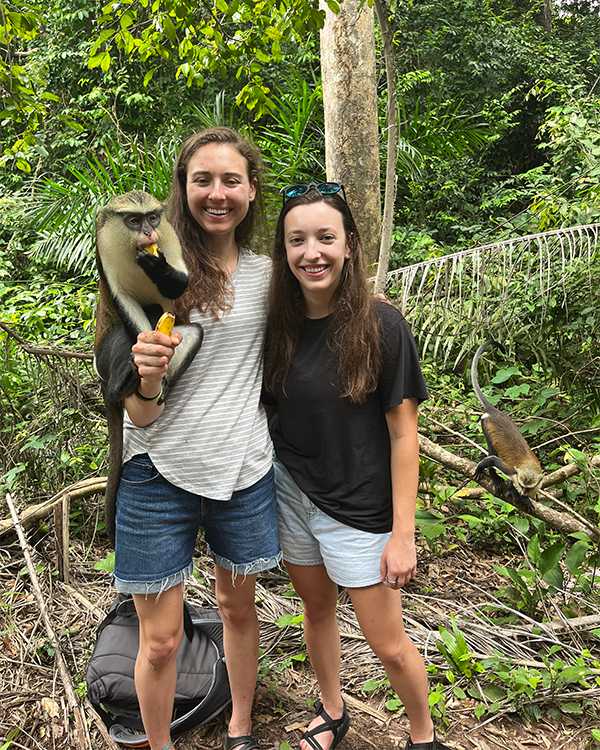Two Georgetown University School of Health students have been exploring reproductive and sexual health research in Ho, Ghana, throughout the Fall 2022 semester.
Clare Westerman (NHS ’23) and Emme Rogers (NHS ’22) are more than halfway through 15 weeks of academic work in the Ho Municipal District in the Volta Region of Ghana. The two are conducting research in collaboration with the Institute of Health Research (IHR), a multidisciplinary research center at the University of Health and Allied Sciences (UHAS) in Ghana. Rogers is studying malaria treatment education currently provided to pregnant women, while Westerman is researching ways to motivate adolescents to seek sexual and reproductive health services. Westerman and Rogers arrived in Ghana on Aug. 25 and will wrap up their research Dec. 9.

Westerman, a pre-med student, said that the semester has given her an opportunity to uplift adolescent sexual health, an often overlooked issue within the medical field.
“I’m really interested in working with underserved communities and communities that face stigma or barriers on what they need,” Westerman told The Hoya. “And for me, sexual health digs into that. Adolescent health is something we don’t talk about enough.”
As part of her research, Westerman said she is observing the work of health clubs, educational spaces that teach Ghanaian youth about safe sexual and reproductive health practices. These clubs may provide a model for global health education, according to Westerman.
“They had everyone in a big room, and they had boys and girls together, which I thought was kind of cool, because their topic was menstruation,” Westerman said. “It was very participatory. It was kind of what I wish my health classes had been.”
Rogers said she wanted to utilize her time in Ghana to examine health education in clinics, specifically focusing on the dynamic between health providers and pregnant women.
“Pregnant women are especially vulnerable to malaria,” Rogers wrote to The Hoya. “I was very interested in knowing why women weren’t taking the drug if they were already attending the clinic. In short, my research has shown that they aren’t getting quality health information from their providers, so they don’t realize why it is important to get the complete dose.”
UHAS medical and organizational anthropologist Matilda Aberese-Ako, a visiting scholar with Georgetown’s Department of Global Health, will join Westerman and Rogers in Ghana in the coming days. She is currently teaching a master’s program on Georgetown’s campus.
Aberese-Ako said she has encouraged Georgetown students entering the IHR program to select topics that can make a meaningful contribution to Ghanaian health knowledge.
“Because students want to learn new things, it makes it easy for me to work for them,” Aberese-Ako told The Hoya. “We love for students to do topics that are really critical to Ghana health service. We want the work to be practical and serve people in Ghana.”
According to Aberese-Ako, past Georgetown students have made significant impacts on the community in Ho. Aberese-Ako said that one student was involved with a local church and connected with the city through religion.
“When she went to the church she became so integrated,” Aberese-Ako said. “This lady was so much a part of the community that she was participating in organizing funerals and activities for her Ghanaian family. I would say she has a family in Ghana.”
Rogers and Westerman have been working remotely as Ghanaian unions representing teachers and university personnel, including UHAS scholars, have been on strike in order to seek increased educational funding in response to inflation. The protests follow an unsuccessful Oct. 14 meeting in which the Ghanaian government did not meet unions’ demands on issues including vehicle maintenance and off-campus allowances.
Westerman said that while she would prefer to conduct her work in person, she supports the mission of the unions and the rationale behind the strike.
“I definitely miss going into the office, I am a person who likes being around other people and enjoying that set structure,” Westerman said. “It was definitely an adjustment, but I’m glad they are doing what they are feeling they need to do for their workers’ rights.”
Rogers said that working alongside experienced researchers in a new country has taught her both important technical and life skills.
“UHAS has an incredible team of researchers. I’ve learned, and continue to learn, so much from them,” Rogers wrote. “Ultimately, this experience has honed my ability to adapt to new situations and be able to go with the flow. I’ll be forever grateful for those skills.”




















